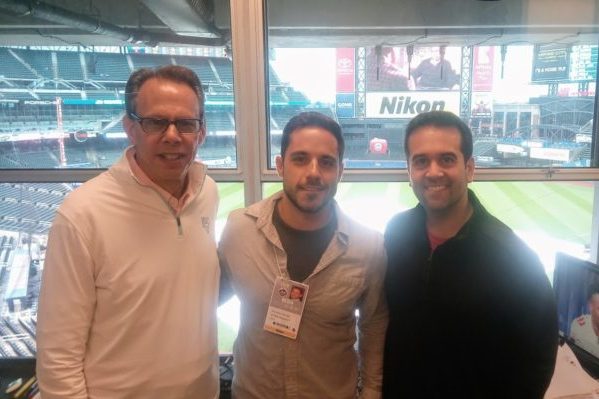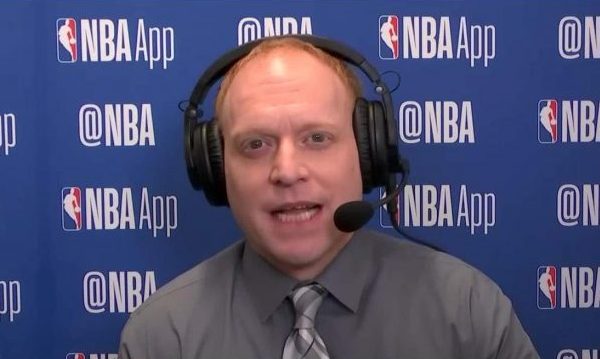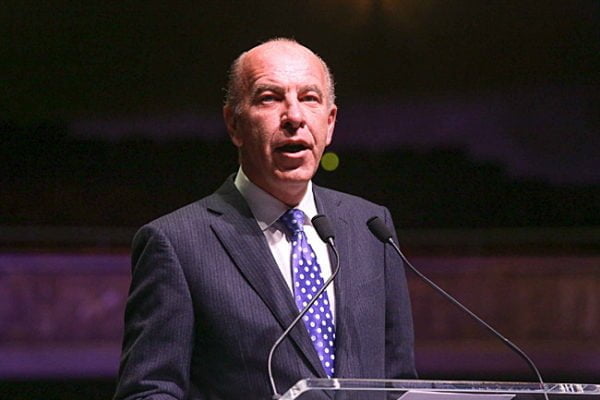Between TV and radio, the New York Mets have two of the best local broadcast teams in sports. On Friday, September 6th, I spent time with Mets radio announcers, Howie Rose and Wayne Randazzo to watch them call a game. Over the air, the broadcast sounds effortless, but behind the scenes there are plenty of moving parts, with Rose and Randazzo arriving more than four hours before first pitch.
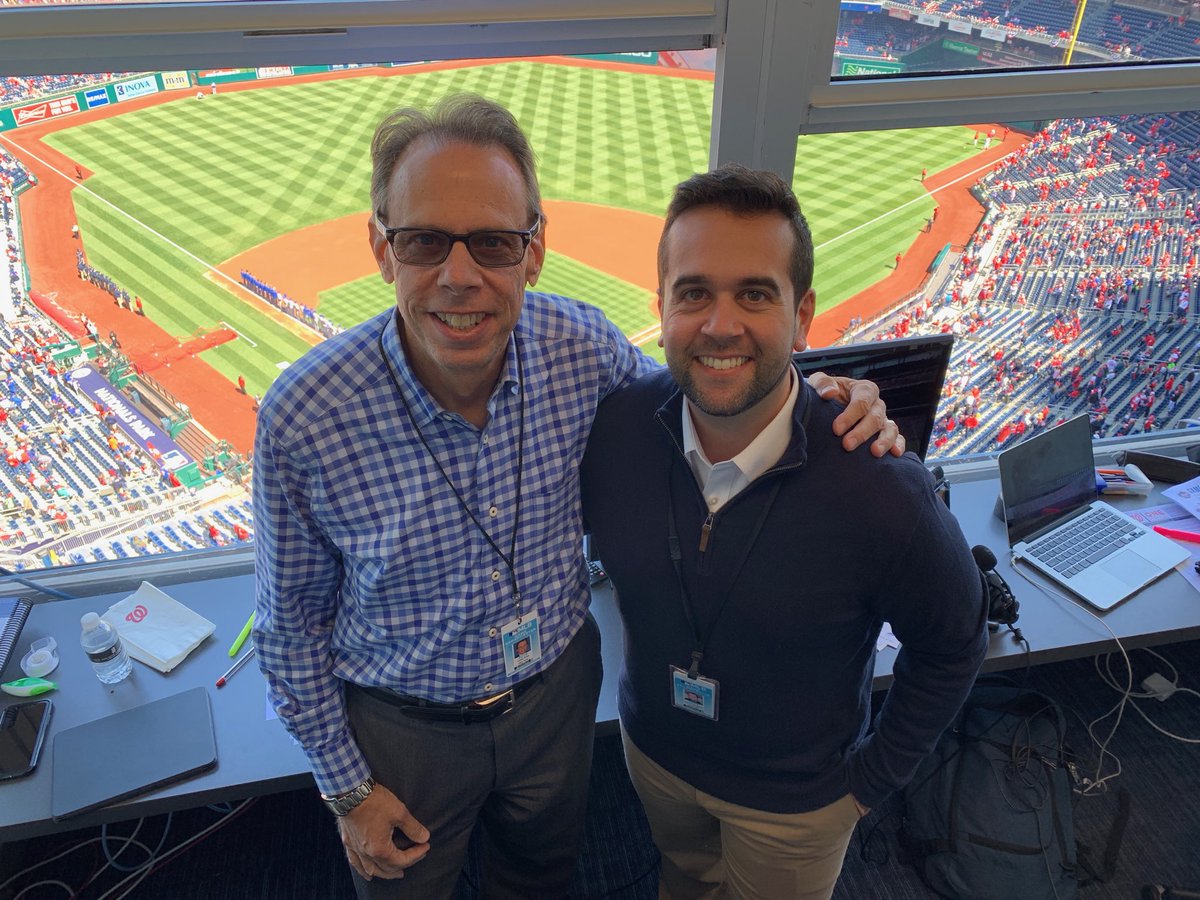
By 3pm the Mets radio duo, is already in the stadium for a 7:10pm start, individually filling out their scorebooks before heading to the manager’s press conference. Rose and Randazzo separately arrive in the press room where Mets manager Mickey Callaway responds to his first question promptly at 4pm. Howie and Wayne are mostly quiet, taking a few notes as beat reporters search for a tweet-worthy quote during the 10-minute presser.
Right outside the room, General Manager Brodie Van Wagenen sits like the Godfather in a large armchair, welcoming reporters to approach him for one-on-one questions. Today, rain leads to the sound of indoor batting practice as players shuffle from the clubhouse to the cage. While players are readily available for questions, Rose and Randazzo aren’t searching for an inside scoop or anyone to chat with, instead leaving that up to the beat reporters.
“If I need to” Rose said when I asked if he ever looks to talk with players prior to the game. “They have enough reporters hanging out around them, they don’t need me to clog it up anymore. Seriously, I don’t need to be hanging around there unless I have something to say to somebody. There’s probably 15 people for three players in there. When I have a question for a player, I’ll find them.”
At 4:20, Callaway heads into the interview room to speak exclusively with Mets broadcast partners SNY and Entercom’s WCBS 880. Rose, Randazzo and SNY’s announceing crew are behind closed doors with Callaway for five-minutes. While exiting the interview room, Callaway notices a new face and politely walks over to introduce himself to me.
“Mickey’s been great, easy to deal with,” said Randazzo, who hosted the Mets radio pregame show for four years before being named Howie’s full-time broadcast partner this season. “[Terry Collins] before Mickey was a guy that would light up the pregame show, he was always so colorful, but Mickey still has been good, he’s always open and accessible.”
By 5 o’clock Howie and Wayne are back in the booth organizing their pregame notes. Howie sits on the left and both announcers have the lineup taped to a nearby wall with one TV monitor available to Wayne’s right. After their prep, Howie and Wayne head to record videos for the in-stadium scoreboard. Rose can later be seen on the big screen offering fans a “Game Notes” segment, with Wayne providing the “Randazzo Report.”
At 6:30, Brad Heller begins the WCBS Mets Radio Network pregame show. September 6th is one of 40 games that Heller worked this season, the rest are conducted by longtime Mets reporter Ed Coleman. The 30-minute pregame show features Heller’s exclusive chat with the Mets manager and almost takes the broadcast up to first pitch.
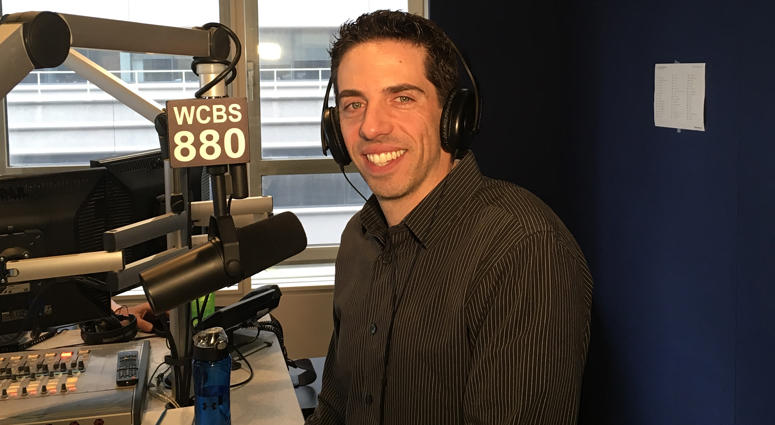
At 7:01, Rose welcomes listeners and provides the setting for tonight’s game against the Phillies as the Mets play meaningful baseball in September for the first time since 2016. Randazzo gives his detailed description of both teams’ uniforms, painting a picture for the listener before sending the call back to Howie for first pitch. After starting the game with a 1-0 count, Mets lefty Steven Matz retires the leadoff hitter with a strikeout as both announcers simultaneously mark a straight “K” in their scorebook.
Howie has a highlighter, black and red ink to fill out his scorebook, Wayne adds extra color with blue, pink, green and purple fine point markers. Randazzo also keeps his laptop in front of him, showing Twitter, MLB Gameday and Baseball Reference on the screen, noting that he doesn’t mind looking up information while calling a game. Randazzo even starts mapping out the postgame show before the game is over.
On a cool and rainy night that has the feel of October, Howie and Wayne keep the windows open allowing the opportunity to hear the crowd. The fans filed in slowly, but by the 3rd inning more than half the seats were full, garnering more than expected on a night that many thought would be a rain out.
A good crowd can absolutely enhance a broadcast, as the energy from a raucous fan base is felt through the radio. Both Howie and Wayne expressed how much fun games in August and September are with the Mets making a playoff push that seemed impossible a few weeks earlier.
“It makes it!” Howie said of calling meaningful baseball with an energetic crowd in the building. “Go back to when Washington was here in early August, things were pretty quiet most of the season until then and now all of a sudden they were relevant and this place was ELECTRIC for that three game series, it felt like 2015 again.”
“There’s a different tone based on what’s happening in August and September,” Randazzo added. “If they’re losing and McNeil or Rosario are up to bat, you’re talking about projecting the future, but when the team is in the playoff race, you’re talking about what’s happening right now and how important each game is.”
Wayne takes over the play-by-play to start the third inning as Robbie Cano’s friend and former teammate, Jean Segura leads off for the Phillies. The next inning, Wayne gets to call the first homerun of the game, a 425-foot blast off the bat of Michael Conforto setting a new career high for the Mets outfielder.
Had this WCBS 880 Mets radio broadcast occurred on a weeknight, Randazzo’s call may have been used by the morning show on their sister station WFAN. Earlier in the summer, Gregg Giannotti of Boomer and Gio came to the realization that Randazzo’s voice takes on a 1940’s tone when the broadcaster is behind the mic for an exciting call. Gio’s characterization of Randazzo became a regular bit on WFAN’s morning radio show throughout the season and Wayne has no problem with that.
“No, I don’t mind it,” Randazzo said with a chuckle. “I can actually do a really good impression of that if Gio wants to hear it, I’d be happy to do it.”
“I just think it’s cool that Boomer Esiason knows who I am,” Randazzo added.

At the start of the 5th inning, Randazzo gets set to throw the play-by-play back over to Rose, but not before he calls one more pitch from Steven Matz. Matz’s pitch sailed to the backstop, reminding Randazzo of the lefty’s first Major League pitch in June, 2015. Rose jumps right in, adding that Brandon Phillips hit a homerun after that 2015 wild pitch. It’s a simple exchange between Randazzo and Rose, but the type of back and forth that comes natural for two radio partners working their first season together. Rose spent the last seven years with Josh Lewin in the booth, but the adjustment of sitting next to Wayne Randazzo has been an easy one.
“It’s been wonderful, there’s been no learning curve,” Rose said of his new broadcast partner. “I was just part of the process of sifting through tapes, when we hired Wayne going back five or six years, I wasn’t making the decision. I could give advice or opinion, but I wasn’t doing the hiring. When you hire somebody in this role (pre and postgame host), you know you might be hiring your future partner and that’s one of the things I looked for when we were canvassing the applicants, ‘is this a person who can do this job on a regular basis versus just 10 or 12 times as a fill-in?’ Howie asked.
“The thing that impressed me most about the tape Wayne submitted was his work in a no-hit bid by Jake Arrieta when he was with the Cubs. It didn’t even dawn on me until much later, that Pat Hughes (Chicago Cubs radio voice) does every inning of every game!” Rose added. “That was just a practice tape from Wayne, he went into a booth and recorded that on his own, it wasn’t an audition and that blew me away! I knew right there we had a real serious and aspiring broadcaster, not someone just going through the motions. Also, the fact that Josh would miss between six, eight or ten games during the season in recent years – Wayne would fill in, so it was sort of an icebreaker that helped give us the ability to hit the ground running this year.”
“I get to sit here with someone who’s seen every game this team has ever played and is truly one of the best baseball announcers in the business,” Randazzo said of his iconic radio partner, Howie Rose. “As someone that’s trying to one day be that, it’s like a masters’ or doctorate level course in how to do this that not everyone is allowed to have. Even in our meetings with the manager, just watching how Howie and [Gary Cohen] approach the daily questions to see what’s on their mind and what they’re seeing has always been something I’ve learned a lot from, not to mention how they are on-air. Howie has brought out the best in me as a broadcaster and play-by-play person and whether he wants to admit it or not, I’ve learned six million things from him this season and over the last few years when I was doing the pregame show that will stay with me forever.”
Rose’s Mets coverage dates back to the 1980s, when from 1987 – 1995, the broadcaster hosted Mets Extra on WFAN. Since 2004, Rose has been a full-time radio play-by-play voice for the New York Mets, following a tenure calling their games on TV for Fox Sports New York and MSG. Randazzo, a Chicago native is finishing up his first year as Rose’s full-time play-by-play partner, following four seasons as the Mets pregame show host.
“I’ve always wanted to be doing what I’m doing now. Everything I’ve done in my career was done with this in mind,” Randazzo said. “I’ve done updates on 670 The Score, I filled in on White Sox pre and post, did pre and post [on the Mets Radio Network], went to the minor leagues for seven seasons. All of that was to hone my skills, all I’ve ever wanted to be was a baseball announcer so it was building to get to this point and I’m lucky to be here.”
In the sixth inning, Rose openly questions a decision by Mickey Callaway to make a pitching change and remove the left-handed Matz against Phillies pinch-hitter Phil Gosselin, triggering a chess match of decisions. Mets broadcasters are never short on honesty even if it means being critical, something ownership deserves credit for allowing.
Growing up a Mets fan, I was trained by their broadcasters to think critically. Team announcers could take the approach of finding reasons to defend every managerial decision, but instead, they never hold back on presenting an opposing view. As a fan and a listener, I enjoy playing devil’s advocate to see if there is a better in-game decision to be made and Mets broadcasters promote that way of thinking.
Critique and honesty from the Mets radio crew was never more exemplified than in a game against the Phillies on June 26th earlier this year.
“The shortstop is behind second base, he’s got it and he throws to first, you know why? Because Robinson Cano was jogging – he was jogging,” Rose said after a lethargic Cano was thrown out by Phillies infielder Jean Segura during the June 26th broadcast.
“Segura treated him like Wilson Ramos. A lot of times infielders pick the ball up and take that second step because they realize they don’t need to hurry, well in that instance, that’s what Segura did,” Randazzo explained.
“I say unbelievable, but it’s something we’ve talked about all year, if he thinks he’s protecting his quad at this point – oh who cares anymore, what’s the sense of getting on a soap box, it is what it is,” a frustrated Rose continued. “You have to figure he’s going to rest tomorrow right? A day game after night game?”
“I don’t know – maybe McNeil’s the one that’s going to rest tomorrow,” Wayne said sarcastically, noting the Mets tendency to rest one of their young All-Stars.
Even after getting back to the play-by-play, the Cano critique still filtered in, with Rose saying the Mets high-priced second baseman “…chose to jog – fill in whatever blanks you want, we’ve already used them.”
“Segura, who I mentioned before is very good friends with Robinson Cano, it took him by surprise,” Randazzo said.
“It shouldn’t,” Rose added defiantly.
“If the quad continues to be an issue, let’s give Cano the benefit of the doubt for the sake of this point, if that’s going to continue to be an issue, then why is he still hitting third?” Rose asked regarding the Mets decision to place Cano in a premium batting order spot.
I revisited this specific exchange between Rose and Randazzo from June 26th, noting that they didn’t hold back in their criticisms of both Cano and the team.
“That’s my job,” Rose told me.
Every Mets fan listening to the broadcast has similar conversations regarding questionable on-field play or in-game decisions. It can be refreshing to hear professional announcers share the sentiment and not be afraid to broadcast their frustrations publicly. When I asked if management ever told them to be less critical, the Mets longtime broadcaster responded, “not a word.”

“Our owners have never been given the proper credit for allowing the broadcasters to do their job and that goes for TV and radio. You won’t find a more opinionated television crew than we have and that’s pretty well established. They’re given the latitude to call it as they see it,” Rose said regarding the Mets broadcast booth on SNY.
“You’re working with a hall-of-fame caliber play-by-play guy (Gary Cohen) who’s been here 30 years so he’s built up some points on his resume and you’ve got two world champion players (Ron Darling and Keith Hernandez) sitting next to him. They have credibility and nobody is going out of their way to take hot shots, all we do is like they say in football, read and react. We read the game and react to it.”
“To criticize somebody is not personal,” Rose Continued. “If I had an issue with a player years ago when I was doing pre and postgame shows in a more opinion driven role than I am now, even though we give opinions now, it seemed like I had someone pissed off at me every other day. But most of that didn’t last long because I would make it a point to be right in the middle of the clubhouse the next day and if a player wanted to find me, they could and once in a while they did. We would talk, and once or twice what they were being told was said, wasn’t actually said and I even gave them tapes just so they can understand. It’s never personal and 99.9% of the players don’t take it personal. The only obligation you have is to be fair. If you make it personal or it becomes personal, you’re not doing your job.”
Howie’s credit of the Mets television booth speaks to the respect both crews have for each other. Prior to the game, SNY’s Gary, Keith and Ron can be seen in the media lounge sharing a table with Howie and Wayne. The two groups of broadcasters huddle to discuss the game and almost certainly a multitude of other topics considering their dynamic personalities.
“At that point with Cano, we were also aware that he was trying to save himself for the season,” Randazzo said. “He lost a month for a hamstring injury and was dealing with quad problems, so it’s fair to say that Robbie’s trying to conserve himself, but at that time it was getting kind of egregious. I get that Cano is trying to save himself, but on the other hand you have to show more effort than he had been at that time.”
In the seventh inning, Rose and Randazzo both share a laugh at their producer, Chris Majkowski for the sponsored in-game trivia question he selected. “Maj” hands Howie and Wayne a trivia question that begins with, “which nine Mets…” but neither broadcaster had time to come up with nine answers.

As a producer for more than a quarter-century, Maj has played a vital role in helping the Mets radio broadcast become one the best in the country. During the game, Maj fact checks as needed, noting there are specific words Howie uses when he wants the longtime producer to find or confirm a statistic.
Maj offers an additional set of eyes for the broadcast, letting Howie and Wayne know if there’s movement in the bullpen, or catches something that was shown on TV. As someone who’s seen nearly every inning of every Mets game in franchise history, Rose is already a team encyclopedia, so Maj doesn’t need to be in the announcer’s ear continuously.
Being at the stadium every day for six months, local baseball broadcasters know the pulse of the team as well as anyone, so producers may not need to offer as much information as with national announcers that don’t see the team daily. Maj’s job is less about offering statistical help and more about being able to offer feedback, while also making sure the technical side runs smoothly and the very long list of sponsorships are satisfied.
“I don’t know much about other booths, but whatever we are, good, bad or otherwise, we would be way less without him,” Rose said about Majkowski. “An extra set of eyes. Someone to bounce things off of.”
In the eighth inning of a close game, Mets pinch hitter, Luis Guillorme drops a hard bunt and hustles down the line, leading Randazzo to jump up hoping for a safe call. While radio listeners don’t hear Wayne signaling safe, the announcers’ enthusiasm in rooting for the Mets to win bleeds through a broadcast, especially from Howie, a life-long New Yorker and fan of the team.
“When you have a lifetime invested in being around a team, it’s pure and organic,” Rose said regarding openly rooting for the Mets. “The enthusiasm comes naturally, it’s hard to fake it on the air. When the team is doing well, especially at home and you have more people here than you might otherwise, you don’t think about this pumping you up, but it naturally happens. One of the games against Washington, Marcus Stroman was great, he struck out six or seven in a row, he’s very emotional and animated. The crowd was just eating out of the hand. You ride that wave because it reminds you how different it is to call meaningful games as opposed to not being in the race in August and September. You live for this.”
On this night the wave of Mets fans’ emotions were in full swing. With a two-run lead in the ninth-inning, the Mets highly touted closer, Edwin Diaz entered the game in the midst of a disastrous season. Diaz blew the save.
“It is almost incomprehensible that Edwin Diaz has given up yet another huge homerun,” Rose said as the Phillies tied the game with a two-run blast by JT Realmuto.

Even with a defeating top of the ninth, this story will end exactly how I hoped. In the bottom of the inning, the Mets young slugging superstar, Pete Alonso draws a bases-loaded walk to break the tie and allow Howie Rose to close the broadcast with the phrase that signals victory, “Put it in the books!”
Brandon Contes is a freelance writer for BSM. He can be found on Twitter @BrandonContes. To reach him by email click here.
Brandon Contes is a former reporter for BSM, now working for Awful Announcing. You can find him on Twitter @BrandonContes or reach him by email at Brandon.Contes@gmail.com.




